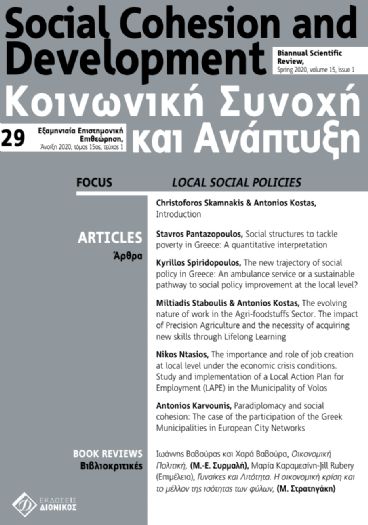Networks of Solidarity Cities: The Social Dimension of the City Networks within the Europe for Citizens Programme, 2014-2020
Abstract
The European Union is built on solidarity: solidarity between its citizens, solidarity across borders between its Member States, and solidarity through support actions inside and outside the Union. Solidarity is a shared value which creates cohesion and responds to societal challenges such as the recent refugee and migration crisis. But what does solidarity mean within the European Union, especially in times of crisis? What are the legal, political, economic and even ethical limits of European solidarity? The unprecedented arrivals of migrants and refugees in recent years in particular have put Europe's solidarity to the test. Under the Europe for Citizens programme 2014-2020, citizens were given the opportunity to discuss the topic of solidarity as a multiannual priority during that programming period and to assess existing solidarity mechanisms inside the EU. This article underlines the role of the city networks measure of that European programme in which municipalities and their associations working together had the opportunity to develop partnerships of towns to make and develop the solidarity principle more sustainable in a long-term perspective. In this respect, despite their disparity, city networks share common aspirations: exchanging experiences and knowledge, enhancing the skills of their members' executives, exerting influence, securing international representation and defending their interests.
Article Details
- How to Cite
-
Karvounis, A. (2022). Networks of Solidarity Cities: The Social Dimension of the City Networks within the Europe for Citizens Programme, 2014-2020. Social Cohesion and Development, 16(1). https://doi.org/10.12681/scad.32112
- Section
- Reports

This work is licensed under a Creative Commons Attribution-NonCommercial-ShareAlike 4.0 International License.
Authors who publish with this journal agree to the following terms:
- Authors retain copyright and grant the journal right of first publication with the work simultaneously licensed under a Creative Commons Attribution Non-Commercial License that allows others to share the work with an acknowledgement of the work's authorship and initial publication in this journal.
- Authors are able to enter into separate, additional contractual arrangements for the non-exclusive distribution of the journal's published version of the work (e.g. post it to an institutional repository or publish it in a book), with an acknowledgement of its initial publication in this journal.
- Authors are permitted and encouraged to post their work online (preferably in institutional repositories or on their website) prior to and during the submission process, as it can lead to productive exchanges, as well as earlier and greater citation of published work (See The Effect of Open Access).




